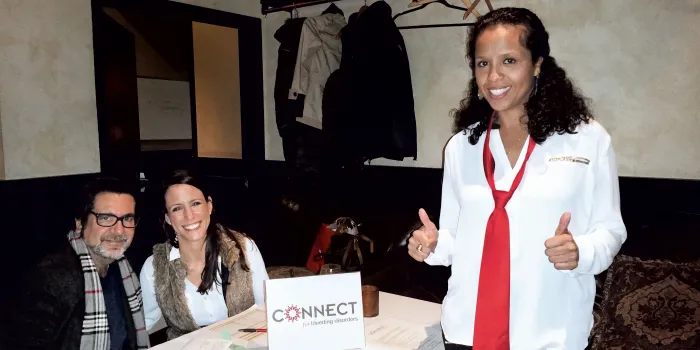Because millennials approach certain situations differently than older generations do, including the ways that they donate to charitable causes, the National Hemophilia Foundation (NHF) launched a new giving society for younger adults, ages 21 to 40.
The Young Hope Society (YHS) is designed to inspire younger supporters of the bleeding disorders community and keep them involved with NHF.
“It’s our turn,” says Nikole Scappe, 26, of Pittsburgh, an alumna of NHF’s National Youth Leadership Institute program who interned at NHF headquarters this summer and helped to create the YHS. “Those who have paved the way have left us incredible shoes to fill. It’s our turn to step up and inspire the next generation.”
Data from the Millennial Impact Report, sponsored by the Case Foundation, show that millennials prefer to donate to causes that are important to them, and if they’re motivated by an issue, they’re likely to donate money and volunteer.
“They are driven by passion,” says Aliana Soto, 35, of Harlem, New York, one of the founding members of the NHF fundraising and awareness group Connect for Bleeding Disorders. “They want to be a part of the mission and vision. They want to give their time, not just their money.”
Measurable impact
Millennials want to know that their donations make a difference to the organizations they support, according to the Millennial Impact Report. Today’s young adults want to find out exactly how the money they’ve donated has helped people. Because of this desire for additional information, YHS members who make annual donations of $250 will receive exclusive benefits for their support.
“If young adults are willing to donate their money or take the time to fundraise, it is important for them to know that their contribution made a difference,” Scappe says.
NHF hopes that young members of the bleeding disorders community will join YHS. “Becoming a member of YHS provides an opportunity to give back to the community that gave you something,” Scappe says. “A lot of our young members align with NHF’s goals. Members who make contributions benefit by receiving recognition on the NHF website or gaining exclusive access to events.”
Leveraging social media
Because millennials thrive on social connectedness, NHF’s new giving society may be able to attract new members from its existing members’ social media feeds. Three-quarters of millennials post about causes or issues that are important to them on their social networks, according to the Millennial Impact Report. This exposure may help a wider audience learn about bleeding disorders and NHF events and fundraisers.
“It’s all about the network,” Soto says. “They have bosses and parents, and they have their friends. And if you get a few people to donate, those people may see hemophilia somewhere else, and they’re going to be able to make a connection to it. Thus begins the connection and desire to want to give their time and energy. It’s going to open up a whole new bridge and have outreach to other people.”

